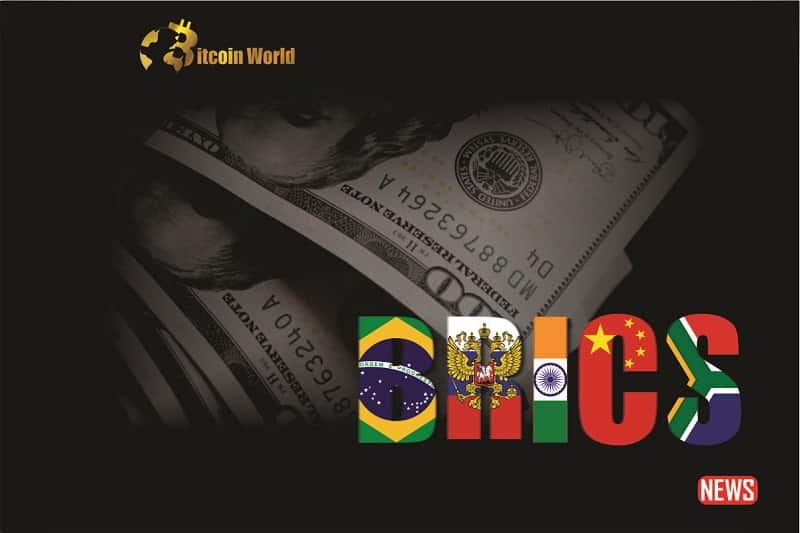Is the reign of the US dollar as the undisputed king of global finance facing a serious challenge? Senator Rand Paul of Kentucky believes so, and he’s pointing the finger at Washington’s own fiscal and foreign policies. In a recent interview with Fox Business, Paul voiced concerns that these policies are inadvertently pushing nations towards alliances like BRICS, fostering a move away from the dollar in international trade. Let’s dive into the details of this potentially significant shift in the global economic landscape.
Why is Senator Paul Concerned About the US Dollar’s Future?
Senator Paul’s argument centers on the idea that the US is becoming increasingly isolated due to its approach to both domestic spending and international relations. He suggests that instead of driving wedges between nations, US policies are inadvertently forging stronger bonds among countries seeking alternatives to the dollar. He doesn’t just point to traditional adversaries; the scope of his concern is broader.
Who Else is Looking Beyond the Dollar? It’s Not Just Who You Think
While China and Russia, prominent members of the BRICS economic bloc, are often cited in discussions about de-dollarization, Senator Paul highlights other nations also exploring alternatives. He specifically mentions:
- Iran and North Korea: These nations, often at odds with the US, are actively seeking ways to bypass the dollar in international transactions.
- Saudi Arabia: This is a particularly noteworthy mention. Historically a close ally of the US and a key player in the petrodollar system, Saudi Arabia’s potential interest in settling commerce in other currencies signals a significant shift.
Paul emphasizes that this isn’t solely about these countries’ inherent desire to challenge the US. He argues that US foreign policy actions have inadvertently pushed them closer together.
What’s Driving This Shift Away from the Dollar?
Senator Paul identifies two primary factors:
- Foreign Policy Decisions: He believes that US foreign policy has, in some instances, alienated nations and driven them to seek closer ties with each other. This collaboration extends to exploring alternative currencies for trade settlements.
- Fiscal Irresponsibility: Paul is critical of the US government’s monetary policies. He argues that excessive debt accumulation and the devaluation of the dollar are prompting countries to look for safer stores of value and more stable currencies for trade.
The Numbers Don’t Lie: A Shift in Global Trade?
Senator Paul points to a noticeable trend in global trade. He observes that a larger portion of international commerce is now being conducted in currencies other than the US dollar. This isn’t a sudden overnight change, but a gradual shift that could have significant long-term implications.
“When you examine the structure of global trade, you’ll notice that more than we’ve seen in a long time, a sizable portion of it is expressed in currencies other than the US dollar,” Paul stated.
The Role of BRICS: A Growing Alternative?
The BRICS economic bloc, comprising Brazil, Russia, India, China, and South Africa (with potential new members on the horizon), has been actively discussing the development of a new reserve currency. While still in its early stages, this ambition underscores the desire of these nations to reduce their reliance on the US dollar. Could BRICS become a viable alternative to the current dollar-centric system?
Is the Dollar Really in Peril?
Senator Paul believes the risk is real. He argues that the combination of foreign policy decisions pushing nations together and unsustainable fiscal policies weakening the dollar creates a perfect storm. As the US dollar’s value potentially declines due to increasing debt, other countries holding significant dollar reserves might see their value erode, further incentivizing a move away from the dollar.
“So, I believe it is imminent. Additionally, your dollar loses value if you use it like scrap paper and keep amassing huge quantities of US debt. Therefore, the dollar is in peril for a number of reasons, including foreign policy and budgetary irresponsibility. And I believe it is a reasonable assumption to say, ‘Yes, we might lose our status as a reserve currency,'” Paul explained.
What are the Potential Consequences?
A decline in the US dollar’s status as the world’s reserve currency could have significant repercussions for the US economy. These could include:
- Increased Borrowing Costs: If global demand for US debt decreases, the US government might face higher interest rates when borrowing money.
- Higher Inflation: A weaker dollar could lead to increased import prices, contributing to inflation.
- Reduced Economic Influence: The US might lose some of its leverage in international finance and trade.
Is There a Way to Reverse This Trend?
Senator Paul suggests that a change in approach is necessary. This could involve:
- Re-evaluating Foreign Policy: Focusing on diplomacy and cooperation rather than isolating nations.
- Addressing Fiscal Irresponsibility: Implementing responsible budgetary practices to stabilize the dollar’s value.
Looking Ahead: Navigating a Shifting Global Landscape
Senator Rand Paul’s concerns highlight a critical juncture in global economics. Whether his predictions fully materialize remains to be seen, but the underlying trends of nations seeking alternatives to the dollar and the growing influence of blocs like BRICS are undeniable. The future of the US dollar’s dominance will likely depend on a complex interplay of geopolitical events and economic policies. It’s a topic that warrants close attention as the global financial landscape continues to evolve.
Disclaimer: The information provided is not trading advice, Bitcoinworld.co.in holds no liability for any investments made based on the information provided on this page. We strongly recommend independent research and/or consultation with a qualified professional before making any investment decisions.




